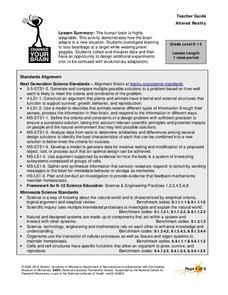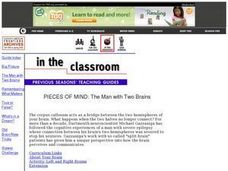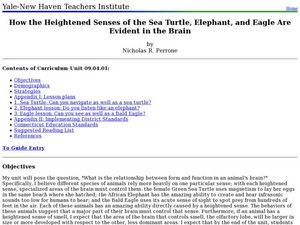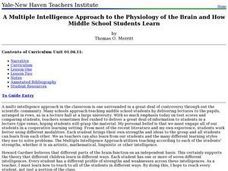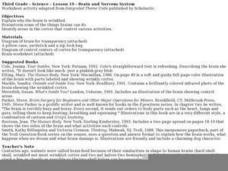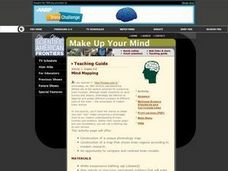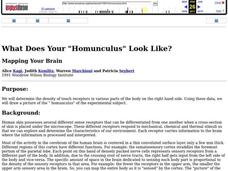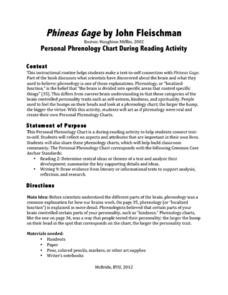University of Minnesota
Altered Reality
Fascinate young life scientists by showing them how their brain learns. By using prism goggles while attempting to toss bean bags at a target, lab partners change their outlook on the world around them, producing amusing results....
Curated OER
Left and Right Brains
Learners research the part of the brain known as the corpus callosum. The part of the brain that connects the left and right brain, students investigate its functions and how data passes from one side to another.
Curated OER
How the Heightened Senses of the Sea Turtle, Elephant, and Eagle Are Evident in the Brain
Students explore the senses of different animals. In this biology lesson plan students will study the animals selected for their grades. The students will learn about the brain and how the senses of that animal have developed.
Curated OER
A Multiple Intelligence Approach to the Physiology of the Brain and How Middle School Students Learn
Students draw a poster of a lateral view of the brain in order to label the different lobes of the brain. They examine what causes some people to be more musically intelligent than others. They dissect a cow's brain and label the...
Curated OER
Nervous System
Are you nervous about teaching the nervous system to your beginning biologists? Worry no more! This PowerPoint provides a note-taking guide and diagrams of the neuron and the brain. Viewers will walk away with a clear...
Curated OER
Brain and Nervous System
Third graders study the physical characteristics of the brain and identify its parts through this series of lessons.
Curated OER
Disorders of the Brain
Students, in groups, conduct research about a specific disorder of the brain, create a character study of a person with that brain disorder, and then present the information to the rest of the class.
Curated OER
Nervous System
Get to know the body's central nervous system through an engaging game of nervous system telephone. But this isn't your average game of telephone. Here, pupils must find a way to communicate a message to the brain without speaking....
Curated OER
Teaching Neuro-anatomy Through Schematic Diagrams
Students develop a deeper understanding of the brain. In this neuro-anatomyl lesson plan, students will use simple diagrams to understand the brain and will progress to more complex diagrams as they gain understanding.
Curated OER
Brain Manipulative Model
Students visualize the major human brain divisions by using a manipulative puzzle to discover the names and functions of the regions. They use this hands-on anatomy aid to study the braqin regions.
Curated OER
How We Learn About the Brain: Teaching the Infant Brain
Students describe the development of an infant from conception to birth. In this biology lesson, students discover how a child's brain develop. They explain how children acquire motor and cognitive skills.
Virginia Department of Education
Cell Parts
What do a bird, an egg, a rabbit, and a toad all have in common? This fun-filled resource explains the similarities and differences between cells and how all cells are similar, yet all are different. Learners begin by depicting a...
Curated OER
The Brain Reflex System And How It Works
Young scholars explore reflexes. For this biology lesson plan, students discover the basic facts about the reflex systems of the brain as they take part in hands-on activities.
Curated OER
The Nervous System
In this nervous system instructional activity, students complete a crossword puzzle given 15 clues about the structures of the nervous system such as the brain and spinal cord and the functions of the nervous system.
Curated OER
Mind Mapping
Students explore the functions of the brain. They create their own "live" model comparing a phrenology chart to our modern understanding of brain function and anatomy. Students compare and contrast brain models.
Curated OER
Recording Electricity in the Brain
In this electricity in the brain worksheet, students read about neurons, electrical impulses, brain activity and EEGs that measure electrical activity in the brain. They answer four critical thinking questions about brain activity.
Curated OER
What Does Your "Homunculus" Look Like?
Young scholars investigate the density of touch receptors in various parts of the body. They discover how the body senses various stimuli, then maps a picture of the "homunculus" of the experimental subject.
Curated OER
What's Wrong?
Students analyze case studies to explore similarities and differences among illnesses. PET images are examined to explore how scientists investigate the changes in the way the brain functions during depression.
Curated OER
Phineas Gage: Personal Phrenology Chart During Reading Activity
Phrenology, the belief that parts of your brain control certain aspects of your personality, is described in Phineas Gage: A Gruesome but True Story About Brain Science. While we now know much more about the brain, learners use this...
University of Minnesota
Dendritic Spines Lab
This is your brain on drugs ... literally! Your neuroscientists-in-training examine the evidence of drug use on the human brain and how neurons change their connectivity when altered by drugs. They then work together to create testing...
University of Minnesota
Get the Point(s)
Do all areas of your skin have the same sensitivity to touch? Playing with the sense of touch, this experiment has scholars guessing how many pin heads gently touch their arm and hand. In the second part, pupils...
University of Minnesota
Connect the Neurons!
Create a neuron frenzy as your pupils play the part of the neurons. An engaging activity creates a human chain of neurons that pass cotton balls posing as neurotransmitters. Scholars learn about pre- and post-synapses as they...
University of Minnesota
Bead Neuron
What do you call a skull without neurons? A no-brainer! A hands-on activity asks scholars to build a model of a neuron using beads. They use their models to study the parts of the neuron and their functions.
Curated OER
Human Skeleton
Promote reading comprehension and practice naming parts of the human skeleton with this online interactive learning exercise! Scholars read about the functions of the human skeletal system, then work online to label a diagram by filling...
